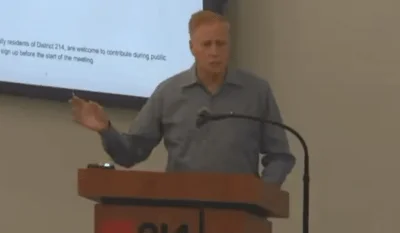Mayor Daniel Biss | City of Evanston Website
Mayor Daniel Biss | City of Evanston Website
City of Evanston Planning & Development Committee met March 31
Here are the minutes provided by the committee:
COMMITTEE MEMBER PRESENT: Devon Reid, Chair
Juan Geracaris, Councilmember
Eleanor Revelle, Councilmember
Bobby Burns, Councilmember
Melissa Wynne, Councilmember
Clare Kelly, Councilmember
Jonathan Nieuwsma, Councilmember
COMMITTEE MEMBER ABSENT:
STAFF PRESENT: Sarah Flax, Interim Director of Community Development
Alexandra Ruggie, Corporation Counsel
Elizabeth Williams, Planning Manager
(I) CALL TO ORDER - COUNCILMEMBER REID
Chair Reid Called the meeting to order at 5:34PM
(II) APPROVAL OF VIRTUAL COUNCILMEMBER PARTICIPATION
(III) APPROVAL OF MINUTES
M1. Approval of the Minutes of the Regular Planning & Development Committee meeting of March 10, 2025.
(IV) PUBLIC COMMENT
Pamela Powell Rosenbush She opposes the Grant Street development. She lives across from it and pointed out that while other builders have completed projects in the same time frame, this developer (Mr. Wallach of Blue Paint Development) hasn’t even started construction in over a year. She questioned his financial credibility, mentioning past bankruptcies and doubting his ability to get financing anytime soon, especially with mortgage rates likely rising. She also said the project's pricing is unrealistic—$449K per unit for small townhomes—when similar-sized condos in Evanston go for far less. She urged the committee to vote against the project.
Cynthia Bebe voiced strong opposition to the Grant Street project, characterizing it as fundamentally flawed in both process and execution. She criticized the decision to route the proposal through a special use permit rather than a planned development, suggesting that the project’s scale and long-term impact warranted more rigorous oversight. Bebe highlighted a persistent pattern of disorganization, citing unresolved financing issues, shifting unit designs, and escalating prices as signs of instability. She argued that the City’s current regulatory framework is insufficient for handling projects of this nature and called for the creation of a new middle-tier category that would demand greater accountability than a special use permit. In closing, she emphasized the project’s lack of credibility and urged the Council to reject it.
Joe Cerillo, a longtime Evanston resident and mortgage industry professional with extensive experience in commercial real estate, spoke forcefully against the proposed development on Grant Street. He questioned the credibility of the developer’s claims, noting that while two units were reportedly sold, no such transactions appear in the MLS—a potential realtor ethics violation. Cerillo emphasized that the lack of written evidence for financing and sales is a red flag, stating plainly that if the project were viable, it would have secured funding long ago. He contrasted this with his own professional track record of closing over a billion dollars in deals.
He further argued that the project would negatively impact neighborhood property values, comparing it unfavorably to similar developments on Noyes Street that, in his view, have already depressed surrounding home values. Cerillo appealed directly to the alderperson and council, urging them to represent the clear and unanimous opposition of local residents. He closed by expressing his deep concern about the project’s impact on the community and his own property, stating he is "embarrassed to live next to this thing" and calling on officials to vote no.
(V) ITEMS FOR CONSIDERATION
P1. Ordinance 25-O-25 Extending the Time for the Applicant to Obtain a Building Permit to Construct the Efficiency Home Development at 1915-17 Grant Street, Previously Authorized by Ordinance 18-O-24
The developer defended the Grant Street project, pushing back on public criticism as misinformed and unfounded. He stated that financing is fully secured, all permits have been applied for, and the requested six-month extension is simply due to the complex 17-permit approval process—not project failure.
He emphasized that the project has received prior approvals from both the Plan Commission and City Council, and was developed in close collaboration with city staff. Design changes—including larger two-bedroom units—were made in response to staff feedback.
He framed the homes as “attainable” housing aimed at Evanston’s missing middle, and argued that criticisms over price ignore market context. He also highlighted the project's sustainability, asserting it will outperform most existing homes in energy efficiency.
In closing, he dismissed claims of disorganization as false and reaffirmed the project's high quality, responsible planning, and community value.
Councilmember Burns strongly supported the project, framing it as attainable housing for middle-income families like his own. He clarified that “affordable” housing has a flexible definition, and that homes priced in the $300,000s can be considered affordable for households earning between 80–120% of the Area Median Income.
He argued the development provides a much-needed alternative to aging, costly, or limited condo options, especially for buyers seeking move-in-ready homes who still want to be rooted in the community.
Burns emphasized the project is privately funded, involves no city subsidy, and meets nearly all the requirements of a planned development—despite technically going through a special use process. According to a checklist he reviewed, the only item not completed was a traffic study, which is not required under special use.
He dismissed claims that the project would lower property values, pointing to the high construction quality and the newness of the homes, which may even improve the surrounding area. He urged consistency from the Council and recommended approving the extension.
Councilmember Nieuwsma asked for clarification on what the Council was voting on.Counsel Alexandra Ruggie explained that the vote was solely to extend the timeline on the special use permit—not to reapprove the project itself. She noted that staff initially miscalculated the expiration date based on the approval date, but it was later confirmed that the deadline is based on the ordinance’s publication date (April 18), giving the project more time than originally thought.
Councilmember Revelle asked how the sale of the affordable unit would be handled and whether the developer is required to work with SEPA. Elizabeth Williams confirmed that for homeownership, the developer must coordinate with SEPA, which maintains a waitlist of interested buyers. Revelle also asked for clarification on the affordability range, and Williams stated it’s for households earning between 80% and 100% of the Area Median Income
Revelle pointed out that the ordinance didn’t mention the completion bond requirement discussed a year ago. Williams confirmed it was part of Council’s decision, and if it’s missing, Legal will correct the oversight.
Revelle also asked about the timeline for construction. Williams explained that per the ordinance, construction must be completed within 24 months of the building permit, which means by October 18, 2027. Completion will be determined by issuance of occupancy permits—either temporary or final—for each unit, since each has its own permit.
Councilmember Revelle addressed concerns from residents about the developer’s financial capability, citing past bankruptcies and slow progress securing mortgages. She also raised concerns about the developer's disregard for neighbors, mentioning complaints about the property’s untidy state despite reassurances it would be cleaned up. Revelle reassured residents about the possibility of the project turning into vacation rentals, emphasizing the council’s potential ban on vacation rentals to protect affordable housing.
She acknowledged the debate over whether the project is truly affordable, appreciating Councilmember Burns' perspective on it being attainable for the “missing middle.” Revelle pointed out that denying the extension could lead to a by-right development of large duplexes or townhomes, which might not meet the same community and sustainability goals. She emphasized that the project adds diversity to housing options and fits well into the neighborhood, especially with its sustainable features. Revelle concluded by supporting the use of a completion bond to ensure the project’s completion.
Councilmember Geracaris asked Elizabeth Williams about potential loopholes in the current vacation rental ordinance, particularly regarding non-owner-occupied units. Williams clarified that under the current ordinance, if the owner does not reside in the unit for more than six months, they cannot rent it as a vacation rental. She acknowledged that someone could try to swap occupancy between two units, but this would need city council clarification and wouldn’t be allowed under staff’s interpretation.
Geracaris also noted the importance of providing various types of housing, including affordable, attainable, and abundant options, and expressed support for the safeguards in place to ensure the project’s completion. He agreed with Councilmember Revelle’s point about using the completion bond and emphasized the need for a more streamlined zoning process to reduce subjectivity and costs. Geracaris concluded by stating his support for the project moving forward.
Councilmember Burns expressed appreciation for the developer’s progress but emphasized the importance of maintaining the property throughout the process. He shared that vacant lots that aren't maintained are a significant concern in his ward, particularly in the Fifth Ward. Burns also acknowledged the challenges of financing homeownership projects, noting that many developers struggle with this aspect, often opting for rentals instead. He explained that securing financing takes time, but the developer has now managed to do so and is ready to move forward with construction.
Burns also clarified his position on different housing types, stating that while he supports this project, he would not support container homes, citing his concerns about their aesthetic and quality. He clarified that he would have opposed them had they come before the council. Burns concluded by reiterating his support for the current project, citing the design and quality of the proposed dwellings.
Chair Reid asked the resident, who has expertise in the mortgage field, to elaborate on concerns regarding potential impacts on property values related to the proposed development. The resident explained that, although the project is presented as affordable housing, the pricing of $349,000 for a 600-square-foot unit might be out of reach for many potential buyers. The resident noted that even with low down payment options (such as 1%), the cost might still be a barrier for buyers, particularly when compared to other nearby properties that offer more space for a similar or slightly higher price.
The resident also raised concerns about the possibility of the homes remaining unsold, especially if short-term rental restrictions (such as on Airbnbs) are enforced, which could lead to vacancies. The resident suggested that this could reduce the desirability of the area and negatively impact neighboring property values. Chair Reid asked the resident to clarify a potential contradiction, noting that the resident was claiming the homes wouldn't sell while also suggesting that increased density from multiple occupants could cause issues. The resident responded that the concern was not necessarily about the project being in their immediate vicinity but about its long-term effects on neighborhood desirability and property values.
This exchange highlighted concerns regarding affordability and potential neighborhood impacts, particularly related to property values and the future of the development.
Chair Reid asked Elizabeth Williams about concerns raised during public comment regarding Mr. Wallik's financing approval. He clarified that he didn't necessarily need an answer to whether the financing had been approved but wanted to know if it was something the council needed to consider in their decision-making process.
Elizabeth Williams responded that financing approval is not typically part of the review process for projects or building permits. However, she pointed out that the city had implemented a completion bond requirement to ensure that construction is completed once it starts. This bond is held by the city until final occupancy is granted, offering a financial safeguard should the developer fail to complete the project.
Councilmember Reid acknowledged the explanation, stated he had no further questions, and proceeded to move toward a roll call vote, noting there were no further requests to speak.
Per Section 6-3-5-15(A) of the City Code, the Applicant, David Wallach of Blue Paint Development, requests a six-month extension to the special use permit approved by Ordinance 18-O-24 to construct an efficiency home development located at 1915-17 Grant Street.
Motion: Councilmember Geracaris
Second: Councilmember Revelle
MOTION PASSED
For Introduction
Motion Passed 7-0-0
Ayes: Reid, Geracaris, Revelle, Burns, Wynne, Kelly, and Nieuwsma
Nayes: None
(VI) ADJOURNMENT
Chair Reid adjourned the meeting at 6:20PM
https://cityofevanston.civicweb.net/filepro/documents/415427/?preview=420287&splitscreen=true






 Alerts Sign-up
Alerts Sign-up